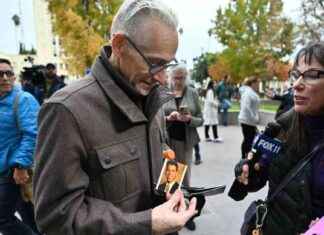The history is a wheel in which different protagonists charge effect according to the times. The historian Nicolás Sánchez-Albornoz (Madrid, 1926) was an active witness of several eras: the franco regime, the exile, the creation of the Cervantes Institute, in 1991, as its first director, and, glancing, now. His flight from the field of work known as cuelgamuros —where they built the Valley of the Fallen— has returned to the focus. And in some ways, become a symbol very useful for the current Government, as left him yesterday very clear to the vice-president, Carmen Calvo, and the homage we dedicated to him the Cervantes: “Soon it will end the ignominy of the dictator buried in a tomb of State. It is not possible”.
There are characters that go down in history for their leaks. “Yours from the indignity to freedom is for us a spur. For the dignity that you represent for a lot of people would like to tell you this, on the part of the Government,” said Calvo. The vice president spoke to the son of the former president of the Government of the Republic in exile, Nicolás Sánchez-Albornoz, as the incarnation of such a reference necessary to settle the transfer of the remains of Franco. “Against those who claim that any thing is worth, we must learn loyalty and respect to move together and not get into dangerous paths,” he said.
it was Not fulfilled a date of commemoration that is specific to the tribute. Arose because yes. In the morning deposited a legacy in the safety deposit box in the madrid headquarters. In the afternoon, went to a table. Introduced Luis García Montero, currently director of the Vevobahis Cervantes, and was moderated by Cecilia Fernandez Suzor, the first team that formed Sánchez-Albornoz in the institution. Engaged historians Leandro Prados de la Escosura, University Carlos III (Getafe); Mirta Núñez, Complutense, and the film director Fernando Colomo, who rolled his getaway in The years to barbarians.
Sánchez-Albornoz, in a state of enviable shape, appreciated the compliments: “So, I take with me to the grave, if not the obituary read, yes at least heard.” Although not just heard. He also talked about. He recalled the origins of the adventure which launched. “The act was passed, but there was no headquarters, nor tables, nor pens, nor paper to write.”
Were the first steps are confusing. Had to deal with the need to understand what it meant to be a institution as well at that time. “We had arrived late. Had already been created decades before in other countries, such as France, Germany, the United Kingdom… we Started with difficulties and little understanding,” he said.
For starters, in relation to the cross: “In the State were accustomed to act on the basis of vertical position. The Cervantes called for a action cross, with connections in many areas, that was complicated.” To all the precariousness joined that opened the first headquarters in Alcalá de Henares. “Just where I was offered a building with a certain package,” he said. “Few were accepting that we were not in the capital.” And then, a certain surrealism in parliament: “As when a senator of the Basin, it occurred to me to ask at the first court appearance: ‘You, what do you think do? How to rehabilitate the house of Dulcinea?”.
Sánchez-Albornoz understood that he had to start from scratch in search of allies. You are worth the courage of their ancient political resistance, the footprint in exile —where he founded in Paris, among other things, the publishing house Ruedo Ibérico,— his career in Argentina or the united States as an historian. “We needed to provide a vision of Spain was more open. Up until that time was based on a certain imperial tradition. When we learned that in the united States is not studying the conquest or who were the Catholic Kings, the fault was theirs, not ours. It was necessary to change all that and get to work so that what began to happen.”







